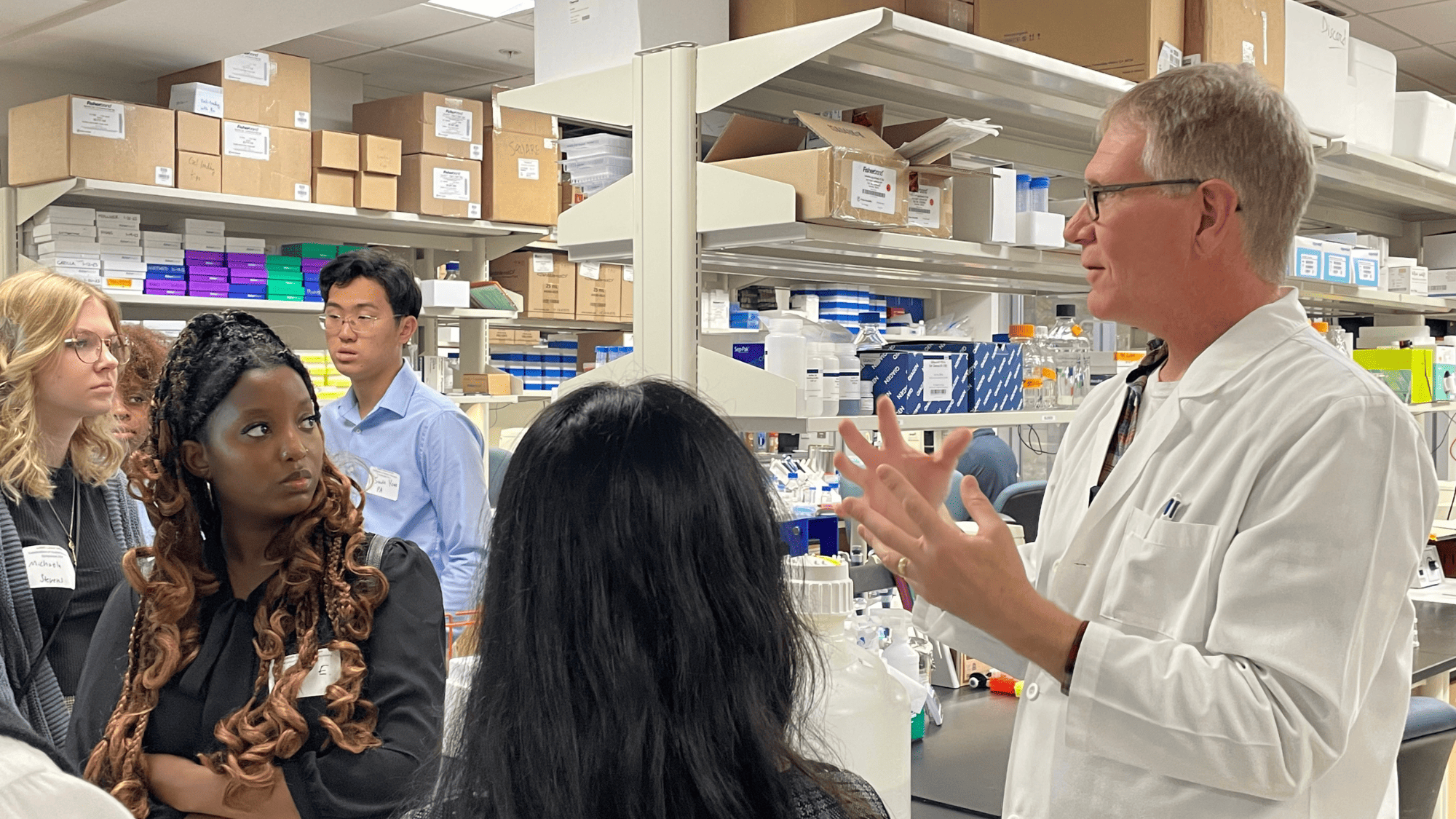Cancer Institute Hosts Annual Celebration of Student Discovery Symposium
| The Celebration of Student Discovery Symposium, now in its second year at the University of Arkansas for Medical Sciences’ (UAMS) Winthrop P. Rockefeller Cancer Institute, recently brought together 50 top middle and high school science students for a day of hands-on learning with nationally recognized cancer researchers.
Students invited to the UAMS symposium distinguished themselves by placing in their school’s science fair competition. Students came from five schools, including Little Rock Central High School, Lisa Academy, Pinnacle Valley Middle School, Arkansas School for Art, Mathematics and Sciences, and Pulaski Academy.
Led by Tom Kelly, Ph.D., UAMS professor of Pathology and the Cancer Institute’s associate director of Cancer Research Training and Education, the event gave students a glimpse of the career paths that science can take them.
“Our mission is to support early cancer researchers with career development and prepare young scientists for careers in cancer research,” said Kelly. “We hope meeting our researchers and seeing our labs will spark their interest.”
The symposium included a guided tour of the National Proteomics Resource housed at the Cancer Institute with deputy director Alan Tackett, Ph.D. Tackett, who took an active role in the day’s events and is passionate about supporting young people with an interest and acumen for science.
“I grew up in Arkansas, and at the time, was never in a position to interact with researchers or scientists,” said Tackett, distinguished professor of Biochemistry and Molecular Biology at UAMS. “I think having that opportunity would have helped me better appreciate the possibilities in research and how science careers can impact the health of others.”
Tackett, who says he wasn’t exposed to scientific research until college, is principal investigator of multiple National Cancer Institute and National Institutes of Health studies and holds the Scharlau Family Endowed Chair for Cancer Research at UAMS.
Kelly says the Cancer Institute’s push to make science careers more attractive to young people is due in part to concerns that Arkansas will lose science talent to other states — talent needed to address unique health care challenges in the state.
“We’re a mostly rural state without a highly developed biomedical infrastructure,” said Michael Birrer, M.D., Ph.D., director of the Winthrop P. Rockefeller Cancer Institute. “That poses unique challenges when it comes to preventing and treating cancer. We need talented scientists who know the state to stay here and make things better.”
Arkansas lags behind the national average in science graduates (25% versus 34% nationally) with a significantly lower percentage of science doctorate holders in the state’s workforce (32% versus 54% nationally).
After tours of the Cancer Institute, students heard Justin Carbage describe science programs offered by the Pathways program in the Division of Diversity, Equity and Inclusion. Kevin D. Phelan, Ph.D., invited the students to attend a summer webinar series that will discuss several organ systems of the human body and the cancers that can afflict them.
UAMS graduate students Carol Morris, Soumiya Pal and Reham Sewilam presented their research in a three-minute thesis format to the students.
The students later had lunch and met in small groups with the institute’s research program leaders and members, Steve Post, Ph.D., Marius Nagalo, Ph.D., Mayumi Nakagawa, M.D., Ph.D., Darin Jones, Ph.D., Jesus Delgado-Calle, Ph.D. and Aric Anloague.
The youngest student at the symposium, 11-year-old Sunita, asked Delgado-Calle, what she needed to do now to be where he is when she is his age.
“You’re already doing it just by being here,” said Delgado-Calle. “Keep exploring and asking questions.”
The symposium also gave the middle school and high school students a chance to showcase their projects and test run their communication skills by fielding questions from Cancer Institute members and leaders in attendance.
“The quality of the research was exceptional,” said Kelly. “We get quite a range of research from cancer to robotic drones for designed seed delivery and pest control in agriculture. These projects, too, were outstanding. Perhaps most important of all is the excitement of the students as they communicate their work to other students and to our research members.”
Recognition topped off the day with the presentation of the Winthrop P. Rockefeller Cancer Institute Special Award for Outstanding Cancer Research to seven students: Bhavana Sridharan, Siddharth Sridharan, Ananya Ud.anti, Shreyam Tripathi, Abbott Kyle, Sherry Liu and Jack Liu.
